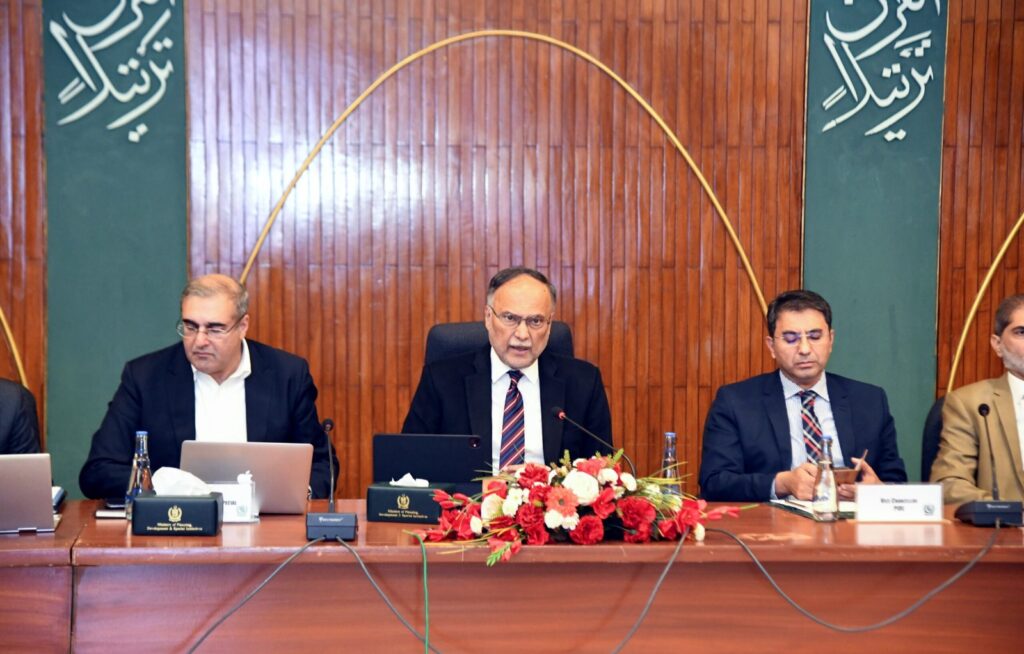
The Central Development Working Party (CDWP) has approved 16 development projects with an estimated total cost of Rs259.68 billion, of which Rs200 billion ($710 million) will be funded through foreign assistance.
Ahsan Iqbal, the Planning Minister and Deputy Chairman of the Planning Commission, chaired the meeting where the projects were reviewed.
The committee recommended that the Executive Committee of the National Economic Council (Ecnec) formally approve seven projects worth Rs232.28 billion. Meanwhile, the CDWP itself approved nine projects, totaling Rs27.40 billion.
The CDWP’s approval powers are limited to projects with costs up to Rs7.5 billion, while higher-value projects require Ecnec’s endorsement after the CDWP’s technical clearance.
Education and Training Sector Projects
• Danish School System Expansion: The CDWP approved the expansion of the Danish School System to Shigar and Sultanabad Jutal in Gilgit-Baltistan, and Bhimber in Azad Kashmir, with a combined cost of Rs9 billion.
• Cadet College in Kharan: A new cadet college will be constructed in Kharan at a cost of Rs2.945 billion.
• Merit and Need-based Scholarship Program (Phase-II): This scholarship program, supported by USAID, has been approved at a cost of Rs2.955 billion.
• Prime Minister’s Pakistan Fund for Education: This Rs14 billion initiative, aiming to set up an endowment fund for scholarships, was referred to Ecnec for formal approval.
Governance and Public-Private Partnership Projects
• Sindh Provincial Support Project: A governance-related project, “Enhancing Public-Private Partnership in Pakistan,” was referred to Ecnec. It has an estimated cost of Rs27.8 billion, which will be financed through a combination of ADB loans, FCDO grants, and contributions from the Sindh government.
Sports and Physical Planning Projects
• Arshad Nadeem/Shehbaz Sharif High-Performance Sports Academy: A sports academy at Islamabad Sports Complex will be established at a cost of Rs2.679 billion. It aims to train 50 elite athletes across 10 disciplines, including athletics, boxing, judo, and more.
• Expo Centre in Quetta: This Rs4.83 billion project will establish an expo centre in Quetta, designed to boost regional business activities.
• Islamabad Techno Polis Infrastructure Development: A project to develop infrastructure for Islamabad Techno Polis at an estimated cost of Rs1.99 billion was also approved.
Energy and Infrastructure Projects
• 220kV Transmission Network: A Rs11.316 billion project for a new transmission network in Islamabad and Burhan will be referred to Ecnec. The project aims to improve the National Transmission and Dispatch Company’s (NTDC) transmission capacity, particularly for power from the Tarbela dam’s fifth extension.
• Karachi’s Green Line Bus System: The installation of integrated intelligent transport equipment for Karachi’s Green Line bus service was proposed at an estimated Rs13.5 billion. This will improve the existing 21km infrastructure and acquire 80 articulated buses, enhancing the public transportation system.
Flood Emergency and Rehabilitation Projects
• Sindh Flood Emergency Rehabilitation Program: A Rs88.4 billion flood rehabilitation initiative in Sindh was referred to Ecnec. The project, primarily funded by the World Bank, aims to restore critical infrastructure and improve resilience, focusing on road restoration, water supply rehabilitation, and strengthening food security in flood-affected districts.
Road Development Projects
• Rawalpindi-Kahuta Road Dualization: A proposal for dualizing and rehabilitating a 28km stretch of road connecting Rawalpindi to Azad Kashmir has been referred to Ecnec for approval. This strategic road serves both civilian and defense needs.
This diverse range of projects spans multiple sectors—education, governance, sports, energy, infrastructure, and emergency rehabilitation—and covers various provinces across Pakistan. Through this comprehensive approach, the government is aiming to bolster regional development and improve the socio-economic fabric of the nation. — ERMD
